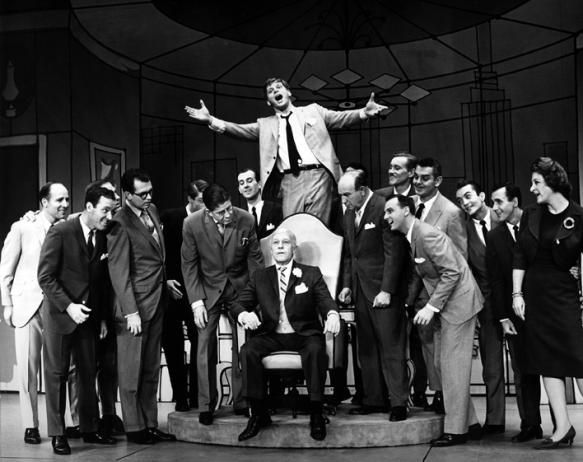“‘Mediocre’ Men Do Better in Finance, Women Say” is one of those headlines that strikes you with the force of forbidden truth. Even at this late date, male mediocrity is so touchy a subject that the New York Times put “mediocre” in quotation marks. Hey, we didn’t say these guys were mediocre—those women did! Never mind that a generalization isn’t going to sue you for libel.
You may ask: Better than whom? It’s intuitively true that mediocre men do better in finance than in certain other professions, like brain surgery or professional pole vaulting, where you can’t fake your way so easily through towel-snapping badinage. But that isn’t what the women interviewed by a London-based nonprofit called Women in Banking & Finance meant. They meant that in finance, it was easier to be a mediocre man than a mediocre woman.
From the study:
About half of the women felt that, at the level of extraordinary performance, merit was adequately attributed regardless of gender. The other half felt that even at this level, performance was misattributed depending on if you were in an ‘in-group.’ Where these 30 women agreed was on the sentiment that women were either labelled competent or incompetent in their ability. However, there was a much bigger distribution of perceived ability among their male colleagues, with ‘mediocre’ men being mentioned explicitly by 22 women.
How do these second-rate males keep their jobs? They belong to clubs—this being London, the women mean literal clubs—where they pal around with “gatekeepers of power.” (P.G. Wodehouse’s Drones Club was an invention, but gentlemen’s clubs remain very much a thing in Great Britain.) Mediocre men don’t take a leave of absence when their children are born. They “fit the social norm” and don’t draw attention as women do. Their bosses see them as breadwinners and therefore grant them more latitude to screw up than women.
The 44 women who were interviewed for the study said you find fewer mediocre men in roles where “Profit and Loss (P&L) metrics were visible,” but that when they wash out in such roles they get tucked quietly into some corner where their mediocrity will be less conspicuous. “Below-average men often survived because they played ‘good politics.’”
This is all demonstrably true, and of course we men gripe about it, too, when we’re feeling underpaid or under-appreciated. Whether you’re a man or a woman, I’m sure you’ve worked for a Mediocre Man at some point, more likely more than one. Mediocre Man seems mostly to dwell in upper management, where performance takes a back seat to organizational pantomime and blame can more easily be shifted to subordinates. In my experience, Mediocre Man is very seldom abusive or mean, because that attracts attention, and Mediocre Man survives largely by deflecting attention.
And what of Mediocre Woman? At the moment she’s mostly a theoretical construct. I can’t recall off the top of my head ever working for one. It does seem as though Mediocre Woman would have a much smaller toolkit for survival, given the persistence of male domination in the workplace.
Left unanswered by the Women in Banking & Finance survey is what we are to do with Mediocre Man. In a world with more equality he would be no more able to climb the greasy pole than Mediocre Woman. But in a world with even more equality—lets call it Stage Two—the rewards for climbing that greasy pole would be greatly diminished. And in a world with even more equality than that—lets call it Stage Three—we’d have to find some way to make it matter less whether a person was mediocre or not.
“Remember mediocrity,” advises J. Pierrepont Finch in How To Succeed in Business Without Really Trying, “is not a mortal sin.” This is sung in the musical’s rousing final number (which, unfortunately for the purposes of my argument, is titled “The Brotherhood of Man”). How To Succeed satirized every aspect of corporate life circa 1961, including sexism. But because it was written in 1961, it also expressed a degree of sexism that was starting to offend even in 1967, when the movie version was released.
Let’s set that aside and consider J. Pierrepont Finch’s point. Mediocrity really isn’t a mortal sin, much as our meritocracy insists on telling us it is. Contemporary liberalism is somewhat tainted with the conviction that being smart in the ways our society most rewards is all that matters. This is useful when decrying male privilege at the World-Wide Wicket Company, but it’s a serious obstacle in relating to people whose lack of a college degree or some particular talent meant they couldn’t get a job at World-Wide Wicket Company if their life depended on it.
What should society do with Mediocre Man? Surely he’ll be joined at the World-Wide Wicket Company at some future point by Mediocre Woman. Where are these mediocrities supposed to go?
It’s a question the World-Wide Wicket Company doesn’t have to address right now, when simply making meritocracy more efficient necessitates creating greater gender equality (and racial equality). But at some future time we’ll have to face that there aren’t enough non-mediocre people to go around. And anyway, mediocre people have to eat, too. Scoff if you will, but Mediocre Man is not the stranger you pretend him to be. Take a look in the mirror. There’s at least a little bit of him in all of us, even women, and sometimes more than a little.
This piece originally appeared on Backbencher, the Substack site edited by Timothy Noah.



